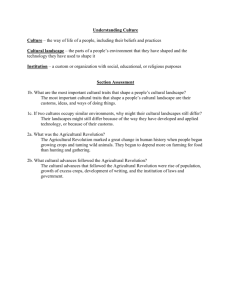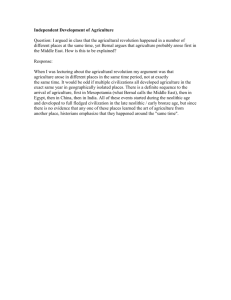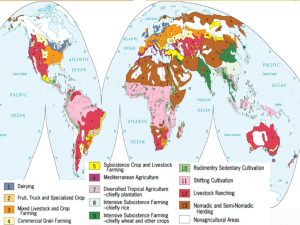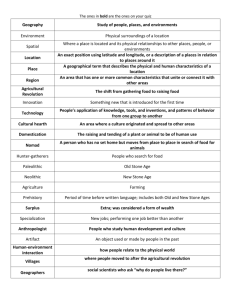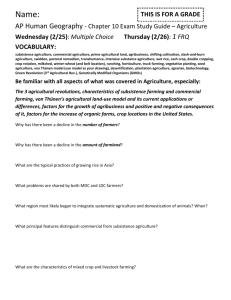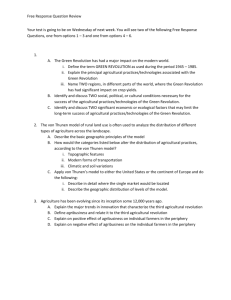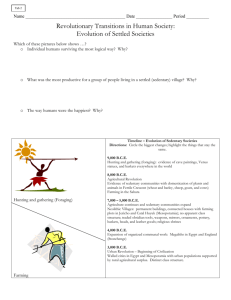Unit Five
advertisement
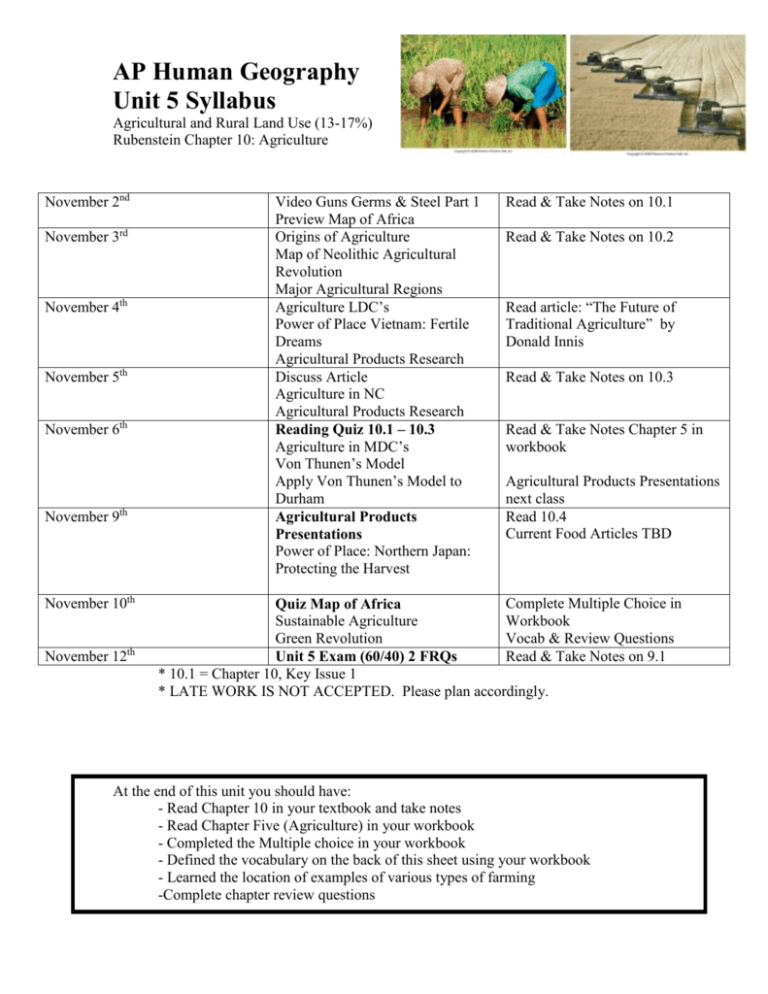
AP Human Geography Unit 5 Syllabus Agricultural and Rural Land Use (13-17%) Rubenstein Chapter 10: Agriculture November 2nd November 3rd November 4th November 5th November 6th November 9th November 10th November 12th Video Guns Germs & Steel Part 1 Preview Map of Africa Origins of Agriculture Map of Neolithic Agricultural Revolution Major Agricultural Regions Agriculture LDC’s Power of Place Vietnam: Fertile Dreams Agricultural Products Research Discuss Article Agriculture in NC Agricultural Products Research Reading Quiz 10.1 – 10.3 Agriculture in MDC’s Von Thunen’s Model Apply Von Thunen’s Model to Durham Agricultural Products Presentations Power of Place: Northern Japan: Protecting the Harvest Read & Take Notes on 10.1 Read & Take Notes on 10.2 Read article: “The Future of Traditional Agriculture” by Donald Innis Read & Take Notes on 10.3 Read & Take Notes Chapter 5 in workbook Agricultural Products Presentations next class Read 10.4 Current Food Articles TBD Complete Multiple Choice in Quiz Map of Africa Sustainable Agriculture Workbook Green Revolution Vocab & Review Questions Read & Take Notes on 9.1 Unit 5 Exam (60/40) 2 FRQs * 10.1 = Chapter 10, Key Issue 1 * LATE WORK IS NOT ACCEPTED. Please plan accordingly. At the end of this unit you should have: - Read Chapter 10 in your textbook and take notes - Read Chapter Five (Agriculture) in your workbook - Completed the Multiple choice in your workbook - Defined the vocabulary on the back of this sheet using your workbook - Learned the location of examples of various types of farming -Complete chapter review questions Essential Questions: 1. Where did agriculture originate? 2. Where are agricultural regions in LDC’s? 3. Where are agricultural regions in MDC’s? 4. Why do farmers face economic difficulties? 5. Why are resources reusable? What should you know, understand and be able to do at the end of this unit? 1. Trace and analyze the origins and development of agriculture. 2. Analyze the characteristics of agricultural systems and production regions 3. Analyze models of land use and agricultural types 4. Analyze the modern commercial agricultural settings and their impact on the environment and quality of live V. Agricultural and Rural Land Use (13-17%) Development and diffusion of agriculture Neolithic Agricultural Revolution Second Agricultural Revolution Major agricultural production regions Agricultural systems associated with major bio-climatic zones Variations within major zones and effects of markets Linkages and flows among regions of food production and consumption Rural land use and settlement patterns Models of land use, including von Thünen's model Settlement patterns associated with major agriculture types Modern commercial agriculture: the Third Agricultural Revolution Green Revolution and the beginning of the biotechnologic revolution Characteristics of the third revolution: blending of primary, secondary, and tertiary activities, intensification of mechanization, and development of biotechnology Spatial organization of industrial agriculture Diffusion of industrial agriculture Future food supplies and environmental impacts of agriculture - hopes and fears Review Questions: Please answer the following questions in complete sentences and hand in on the day of the test. 1. Explain Carl Sauer’s differentiation between vegetative planting and seed planting. 2. The Columbian Exchange is what “happening” in world agriculture? How did this lead to the Second Agricultural Revolution? 3. What are the characteristics of the Second Agricultural Revolution? In what region of the world did this occur? Why only there? 4. Compare and contrast the following rural settlement patterns. Explain how these patterns relate to land use. a. linear villages b. cluster villages c. dispersed settlements 5. Identify the global agricultural regions. Explain how each of the following correlates with the region. a. climate b. terrain c. culture d. relationship to world markets 6. What are the characteristics of the Third Agricultural Revolution? Why did it become the Green Revolution? 7. Construct a chart detailing the positive and negatives views of the Green Revolution. 8. Around the world, agribusiness is growing. Explain agribusiness. 9. What impact does agribusiness have on subsistence farming? Agriculture Terms For each vocabulary term write the definition and either give the significance or an example. This should be done on index cards. 1. agribusiness 2. agriculture 3. agricultural hearths 4. biotechnology 5. cereal grain 6. Colombian Exchange 7. commercial agriculture 8. crop rotation 9. desertification 10. dispersed settlement pattern 11. double cropping 12. enclosure 13. Green Revolution 14. horticulture 15. intensive agriculture 16. intensive subsistence agriculture 17. location theory 18. long-lot survey system 19. milkshed 20. mixed crop and livestock farming 21. Neolithic Agricultural Revolution 22. nomadism 23. organic agriculture 24. paddy 25. plantation farming 26. post industrial societies 27. primary sector v. quaternary sector v. secondary sector v. tertiary sector 28. primogeniture 29. ranching 30. Second Agricultural Revolution 31. seed agriculture 32. shifting cultivation (swidden agriculture) 33. slash and burn agricultural 34. subsistence agriculture 35. sustainable agriculture 36. Third Agricultural Revolution 37. truck farming 38. vegetative planting 39. “world breadbasket”
